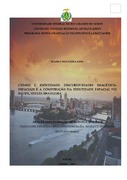Use este identificador para citar ou linkar para este item:
https://repositorio.ufrn.br/handle/123456789/16349| Título: | Cidade e identidade: discursividades imagético-espaciais e a construção da identidade espacial do Recife, Veneza Brasileira |
| Autor(es): | Lins, Juarez Nogueira |
| Orientador: | Silva, Marluce Pereira da |
| Palavras-chave: | Identidades Espaciais;Práticas Discursivas Imagético-espaciais;Heterotopologia;Espacialidade.;Setting Identities;Imagetic Setting Discoursive Practices;Heterotopology;Setting. |
| Data do documento: | 22-Jun-2011 |
| Editor: | Universidade Federal do Rio Grande do Norte |
| Referência: | LINS, Juarez Nogueira. Cidade e identidade: discursividades imagético-espaciais e a construção da identidade espacial do Recife, Veneza Brasileira. 2011. 350 f. Tese (Doutorado em Linguística Aplicada; Literatura Comparada) - Universidade Federal do Rio Grande do Norte, Natal, 2011. |
| Resumo: | Esta pesquisa tem como objeto de estudo a identidade espacial Veneza Brasileira, inscrita nas materialidades discursivas imagético-espaciais (literárias e midiáticas) produzidas sobre a cidade do Recife. A questão central que orienta a pesquisa é: de que modo foi constituída nos séculos (XIX, XX) e é constituída hoje, no século (XXI) a identidade espacial Veneza Brasileira nas práticas imagético-espaciais sobre a cidade do Recife? Inscrita na área de Lingüística Aplicada esta pesquisa se vincula à perspectivas advindas dos Estudos Culturais e articula investigações de Hall (2006), Bauman (1999,2001, 2005), SILVA (2000), Castells (2000) acerca de identidade a dos Estudos Urbanos Santos (1997, 1999), Ferrara (1998), Pesavento (2001) e teorizações foucaultianas (2004, 2006, 2007). Recorre-se ainda a alguns pressupostos teórico-metodológicos da Análise de Discurso Francesa (AD), Orlandi (2001), Gregolin (2007) e Courtine (2006). Define-se como objetivo da pesquisa: analisar os efeitos de sentidos da produção de identidades espaciais, em especial a Veneza Brasileira em práticas discursivas imagético-espaciais (Poemas, Cartões Postais e Guia Turístico) produzidas sobre o espaço urbano da cidade do Recife. A pesquisa é de natureza qualitativa interpretativista e os dispositivos teóricos analíticos subsidiaram gestos de leitura de imagens poéticas e icônicas presentes em fragmentos de poemas do século XIX e 1ª metade do Século XX, em poemas de Manuel Bandeira, Carlos Pena Filho e João Cabral de Melo Neto produzidos na 1ª e 2ª metade do século XX e também imagens fotográficas de Cartões Postais e do Guia Turístico para Visitação a Locais Históricos do Recife. Conclui-se que os discursos imagético-espaciais sobre o Recife produziram diferentes efeitos identitários sobre a Veneza Brasileira durante esses três séculos: no século XIX, a poesia construiu a cidade utópica e o efeito de sentido de unidade identitária; já no século XX, oscilou entre a construção da cidade utópica/heterotópica efeito de unidade e fragmentação identitária, esse último prevalecendo. E, no século XXI, a mídia reconstituiu novamente a cidade utópica e, conseqüentemente, efeitos de sentido de unidade. Estes efeitos de sentido identitários, ao longo destes três séculos ora corroboram ora contrariam a concepção de identidades das teorias pós, à medida que, nas práticas imagético-espaciais, ocorre a (ex) inclusão dos agentes sociais que também constroem essas identidades. |
| Abstract: | This treatise analyzes the identitary setting called Veneza Brasileira (Brazilian Venice) which is subscribed to the discoursive materialization related to the imagetic setting (literary and mediatic) produced about the city of Recife. The main investigation of this research is to examine the way how the identitary setting called Veneza Brasileira has been constructed in the imagetic setting practices about the city of Recife in the nineteenth and twentieth centuries. This study is subscribed to the Applied Linguistics and considers the theoretical perspectives that come from the Cultural Studies which investigation basis is focused on authors such as: Hall (2006); Bauman (1999; 2001;2005); Silva (2000); and Castells (2000) related to the discussion over identity, as well as the discussion over Urban Studies presented in Santos (1997; 1999); Ferrara (1998); and Pesavento (2001). Moreover it is also based on the theoretical basis found in Foucault (2004; 2006; 2007). Furthermore theoretical-methodological approaches rely on the French Discourse Analysis (DA) found in Orlandi (2001); Gregolin (2007); and Courtine (2006). On being so, this treatise aims to: analyze the meaning effects over the production of the identitary setting, especially the so-called Veneza Brasileira, in the imagetic setting discoursive practices (Poems, Post Cards and Touristic Guides) which are produced over the urban setting of the city of Recife. This research is characterized by being qualitative and interpretative and the theoretical analytical approaches contributed to the reading of both poetic and iconic images presented in the excerpts of poems from the nineteenth century and early twentieth century in: Manuel Bandeira s poems, Carlos Pena Filho s poems, and João Cabral de Melo Neto s poems which were produced in the early and late twentieth century. Moreover, this study observed some photographic images in Post Cards and Touristic Guides related to the visiting of historical sites in Recife. One could conclude that the imagetic setting discourse about Recife produced different identitary effects over the so-called Veneza Brasileira along these three centuries: in the nineteenth century, the poetry constructed the utopia city along with the meaning effect of identitary unit; as for the twentieth century, one observed an oscillation between a utopia/heteroutopia city meaning effect of both united and fragmented identity, the latter one is prevalent. As for the twenty-first century, the media reconstructed over again the utopia city, and consequently, produced meaning effect of identitary unit. These same meaning effects of identity either corroborate or contradict to/with the concepts of the postmodernism over identity along these three centuries. In other words, considering the imagetic setting, this oscillation occurs in the proportion of one finds an (ex) inclusion of social agents that construct these same identities. |
| URI: | https://repositorio.ufrn.br/jspui/handle/123456789/16349 |
| Aparece nas coleções: | PPGEL - Doutorado em Estudos da Linguagem |
Arquivos associados a este item:
| Arquivo | Descrição | Tamanho | Formato | |
|---|---|---|---|---|
| JuarezNL_TESE.pdf Acesso restrito | 32,23 MB | Adobe PDF | Visualizar/Abrir | |
| JuarezNL_TESE_PARCIAL.pdf | 3,5 MB | Adobe PDF |  Visualizar/Abrir |
Os itens no repositório estão protegidos por copyright, com todos os direitos reservados, salvo quando é indicado o contrário.

